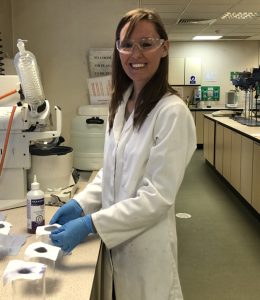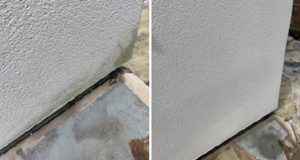 Meet Isabelle Letrez, Development Chemist at Christeyns’ UK headquarters in Bradford and a leading light behind the new micro encapsulated technology
Meet Isabelle Letrez, Development Chemist at Christeyns’ UK headquarters in Bradford and a leading light behind the new micro encapsulated technology
Launderers in both the commercial and consumer market sectors load their machines day in and day out with formula of one type or another. Rarely do we give any thought to what goes into creating the laundry chemicals or how they work and as technology moves forward this is becoming even more complex.
Fortunately, at Christeyns UK there is a woman who knows exactly how they work and why.
Isabelle Letrez joined Christeyns UK in 2011 as a Development Chemist for Cole & Wilson’s wet and dry cleaning. Her role is multi-faceted but covers product formula design and establishment, new product development, competitor analysis, regulatory compliance and performance testing. Formulation development work in both product development and re-development, which involves checking existing products comply with regulations and replacing any banned chemicals.
Isabelle has a Masters Degree in Chemistry and Formulation Engineering from the University of Lille, France. She moved to the UK at the start of her working career and a year and half later joined Christeyns as Development Chemist. As the firm’s parent company is Belgian based, Isabelle’s European connections and language skills have been an additional asset.
In charge of technical development for Cole & Wilson gentle care products, Isabelle works on the range manufactured in the UK & Belgium for use in Europe and worldwide. She also works in collaboration with Belgium on ad-hoc projects for the laundry division, especially on softeners.
“My role is quite a complex one and has expanded over time. Developing products from scratch is only one part of the job. I work with many of the Christeyns team from several departments and clients as well, so there is lots to keep me busy,” says Isabelle.
The new encapsulated softeners Profit fusion, for wet cleaning, and Sultra Aroma, for dry cleaning, were designed by Isabelle. The original concept and suggestion of adding this type of product to the portfolio was hers and after many 12 months of work the products were launched in Autumn last year. Isabelle was the first to develop this type of encapsulation for Christeyns.
Isabelle confirms that laundry technology has come a long way, both from an engineering perspective in terms of efficiency and fabric handling, and from the science side of things where innovative chemistry has led to solutions that prolong the life of linen, its colour, texture and durability.
One of the latest challenges is fragrance. It is widely known that scent is typically volatile and tends to be lost during the wash process, particularly in high temperatures, it also quickly dissipates during use. The innovative Encapsulated Fragrance Delivery Technology allows the aroma from its softeners to remain for an extended period of time, designed in such a way that perfume containing microcapsules adhere to the fibre and break once the textile is handled, providing sustained perfume release.
Innovatively engineered products, like those from Christeyns, not only make the items feel soft and smell good, they do much more.
Protecting the life of the linen is one of the aims in the main wash process, hence the use of a programme like Christeyns’ Cool Chemistry, but it is also an important factor in using a softener. Fibres become smooth and protected thus reducing friction in the wash process, preventing bobbling. Softener also helps keep linens bright, reducing abrasion and helping to retain colour. This keeps the linen looking good, allowing prolonged usage.
Pressing linen, uniforms and other items is much easier and quicker with a good softener, with less energy required in the pressing process. Softener also reduces static cling by neutralising any negative ions. This is especially valuable with workwear items.
“Fragrance is a really big thing,” explains Isabelle. “Different aromas appeal to different market segments, the UK and Europe have different preferences, with some markets relating strong fragrance to increased cleanliness.”
Her encapsulated softeners have a soothing, calm aroma based on coconut and exotic fruits. “The fragrance,” continues Isabelle, “depends very much on the raw materials. There is a general move away from more traditional lavender based aromas towards fresh, spa type fragrances. We use panel testing and a process of elimination to get to the final result.”
When developing new products or redesigning current formulations, Isabelle starts with researching and sourcing raw materials. These must comply with regulations and meet cost parameters. Project plans are developed that involve lab trials, performance and stability testing at different temperatures. Isabelle involves the team in her work, discussing ideas and obtaining feedback.
Once a prototype has been developed, field testing is carried out, customers and specific machines are selected to run test pieces. Feedback and data is collected from these trials for analysis and these customer comments help tweak the final product.
This micro encapsulated technology is complex and so presents challenges in production. Isabelle needed to work in collaboration with the production team to overcome these challenges and she personally supervised the first production batches
Cost, performance and stability are the three parameters that are worked and re-worked for the perfect final result.
In addition, Isabelle is in charge of the regulatory side of development and produces safety data sheets for every product manufactured. These go out to the customer with the chemicals. She also provides tech support for the Cole & Wilson field team and customers.
With her knowledge of the company’s product portfolio, Isabelle is able to link gaps in the current range to gaps in the market. Industry regulation changes can trigger improvement to products or new product development as can customer comments and supplier updates.
As well as a new direction for fragrance other trends are based around sustainability, making products more environmentally-friendly, often to meet new government standards. “Such products do tend to be more expensive and it can take time for industrial laundries to get on board but we are seeing a shift,” says Isabelle. The third trend is for highly concentrated formulas that reduce transport and packaging costs as well as requiring less storage space and meeting new wastewater regulations.
Currently Isabelle is developing innovation around the ProFit range for wet cleaning.
Her work is continuous. “It’s a very varied job, every day is different and that’s what I like about it. No two projects are the same and I work with many different members of the UK team as well as suppliers.
“I love my job, it’s what I studied for. I am part of a bigger process, part of the company and a great team where my expertise is recognised.”




